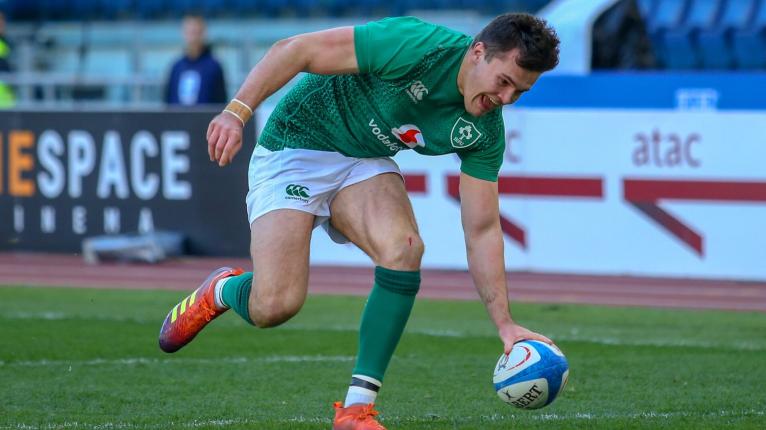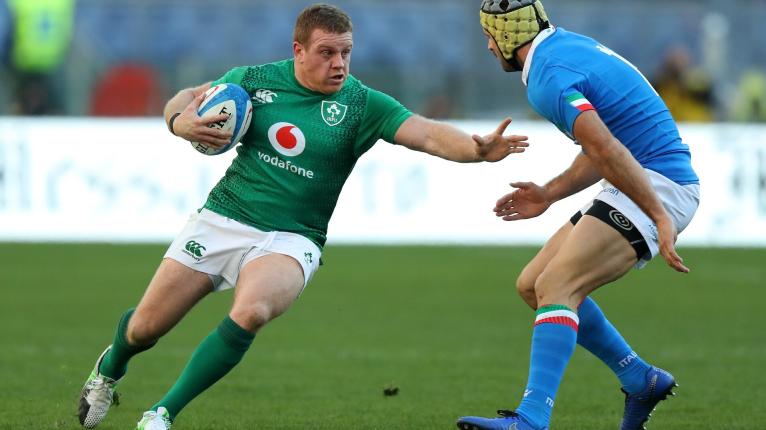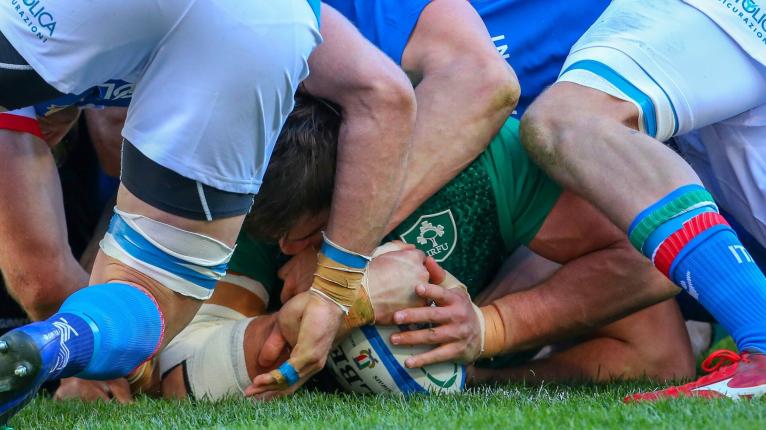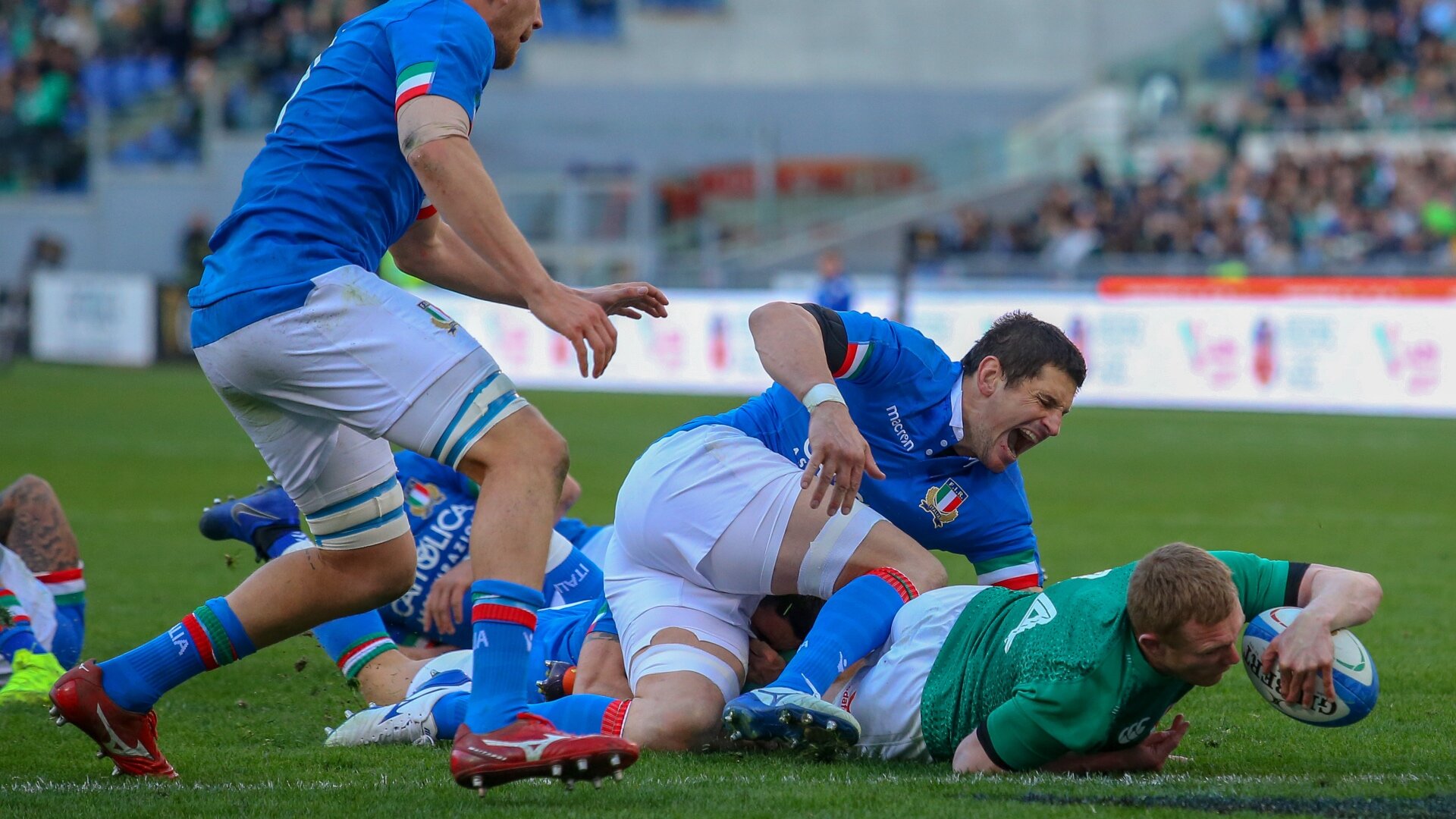Ireland player ratings - versus Italy

Ireland pushed themselves back into the 2019 Six Nations title race with a bonus point win, but that was about the only positive from one of their worst ever performances in Joe Schmidt’s 65-match reign.
The Peter O’Mahony-led side looked over-trained, pedestrian and laboured in the majority of what they did in Rome and embarrassingly trailed Italy either side of the half-time interval.
Schmidt had made four changes to his starting pack, including the resting of veteran skipper Rory Best, and the alterations left them short of the necessary composure and positive attitude to keep the Italians at bay.
Their cause, which suffered immensely from a lineout that often turned over possession, wasn’t helped by key operators such as O’Mahony, Sean O’Brien and the half-back pairing of Conor Murray and Johnny Sexton playing well below their world-class standard against a Sergio Parisse-less Azzurri.
Ireland had two tries on the board within 21 minutes but they found themselves trailing 12-16 at the break on the back of a combination of some poor discipline and scattered defensive connections.
Second-half tries from the impressive Keith Earls and Murray headed off the crisis that would have been a loss to an opposition they had beaten by 43, 53, 37 and 47-point margins in their last four meetings.
Attention will eventually turn to their March 10th match in Dublin against France, but Schmidt has quite a post-mortem on his hands following a 26-16 display that left so much to be desired. Here’s how RugbyPass rated their individual effort:
15. ROB KEARNEY – 5
Impressed when getting his place back against Scotland, but he looked uncomfortable in Rome and wasn’t his usual safe pair of hands. Not a good look for a 30-something who still hasn’t signed off on an IRFU contract extension. He was fortunate to get away with a block on the chasing Tito Tebaldi when Italian pressure arrived during the first half and was caught out badly for the second try conceded. A poor knock-on also occurred early in the second half when Ireland sought much-needed composure, but he made an important intervention on 55 minutes when Federico Ruzza threatened near the line.
14. KEITH EARLS – 8
Pilfered an important try as a starting midfielder against the Italians at the 2015 World Cup and he delivered again here after an early switch to centre following Bundee Aki’s failed head injury assessment. One of the few players to play with a zip and a zest. First-half highlights included a break and a kick ahead that nearly created an Andrew Conway score, and a try-saving tackle on Tebaldi. He then wriggled over the line for the crucial lead-taking score on 51 minutes, and cut a fabulous linebreak 11 minutes later that nearly got Jacob Stockdale in. A polished contribution.
Round 3 complete, with Wales sitting pretty at the summit ???????
How do you think this table will look at the end of the Championship?#GuinnessSixNations pic.twitter.com/uX4sf4FJuk
— Guinness Men's Six Nations (@SixNationsRugby) February 24, 2019
13. CHRIS FARRELL – 6
It was hoped this was an afternoon where he could develop a better understanding with Aki, but Ireland’s regular midfield injury issues put that desire to bed with his partner’s early departure. It left him coping on the fly with Munster colleague Earls and he adapted well, carrying regularly into traffic for some hard-earned metres. It was one such carry that set up Ireland under the posts for Quinn Roux’s try. On the debit side, he was caught out not going low enough in the tackle to prevent Luca Morisi scoring.
12. BUNDEE AKI – 5
A dozen minutes was all he was available for, his match finishing prematurely with his failed HIA. That was a pity as he had been looking for form following a slow start to his Six Nations. He started brightly here, being spotted getting an early rip of a ball carried by Braam Steyn. He also fashioned a linebreak that instigated the start of the pressure that led to Roux’s opening try some minutes later. That was about it, though, which is a worry as he needed a good performance to get him back on his game.
11. JACOB STOCKDALE – 7
The kid’s knack of sniffing out scores was again prevalent in Rome. A comedy of Italian errors from a Johnny Sexton’s halfway line restart gave him an unimpeded straight run-in for perhaps the easiest try of his stellar Test career. There were some defensive concerns – it was in his corner where Italy had a stroll in for a try after an overhead pass eluded him. He then failed to take a pass from Earls that would have to him over for what would have been the bonus try on 62 minutes.

10. JOHNNY SEXTON – 4
Something seriously isn’t right with last year’s World Player of the Year. He’s short on game time and looked very rusty once more, some terrible restart kicks encapsulating just how he wasn’t in his stride at all. Bar in the early exchanges, he also steered clear of kicking duties off the tee. They was some unruly treatment from Italians eager to engage him in the collisions and his discomfort was clear by his body language and with some lacklustre passing. His lack of form is of deep concern with two big games ahead in March.
9. CONOR MURRAY – 5
Was a clear second best to opposite number Tebaldi who was full of verve and swagger. Murray, who far too often was seen complaining to the referee, did eventually chip in with the try off a maul that sealed Ireland’s bonus point on 67 minutes. However, just like Sexton, he is nowhere near his usual standard at this level and the way Tibaldi burgled him in the steal that set up Italy’s second try was illustrative of how he simply isn’t firing. It begs the question: is the neck injury that sidelined him for much of the season a factor in his sluggishness?
1. DAVE KILCOYNE – 7
Ireland’s tidiest starting forward, he can look back with pride on an energetic effort in what was a rare start. Started positively by winning an early scrum penalty inside his team’s 22 and he went on to be eager for more involvement. Lively in the carry, his enthusiasm stood out on both sides of the ball. He won’t displace Cian Healy as the first-choice loosehead, but this performance should help keep him ahead of Jack McGrath in the pecking order underneath.

2. SEAN CRONIN – 4
The excuse will be that the lineout is a unit exercise, but inaccurate throwing has been the one clear bane of Cronin’s career that has held him back and prevented him from better competing for the shirt with Rory Best. Rested for this match, the veteran skipper’s stock will have risen on the back of seeing Cronin struggling to get the Irish set-piece firing. Not hitting the target after an early penalty was kicked into the 22 was a sign that it wasn’t going to be his day and he was pulled as early as the 48th minute.
3. TADHG FURLONG – 5
Usually sets the tempo in the tight exchanges but he had one of those displays where he was dragged down to the general level of those under-performing around him. There were multiple carries but the gain was limited. Another who looked tired and not sufficiently rested up.
4. ULTAN DILLANE – 7
His hands remain an issue. Look at how he cheaply dropped a simple pass by Murray on 63 minutes. However, other areas of game impressed, particular the frequency and desire of his tackling where he started with an intervention that allowed O’Mahony in to force a penalty win. He missed a few minutes of the late first-half mayhem due to blood bin visit, but it was his steal on 65 minutes that helped Ireland zoom in on belatedly securing their bonus.
5. QUINN ROUX – 4
After all the praise he received for how he went at Murrayfield in his first Six Nations start, this fixture passed him by. He can’t take any pleasure in how the lineout was off kilter and his contribution elsewhere – bar the scoring of Ireland’s opening try – was far too limited. Having played in Chicago against the Italians only last November, he should have been aware of what he needed to bring but this might be his last big start for a while.

6. PETER O’MAHONY – 6
Was strangely given the sponsor’s man of the match. When he has received them before, his play has been impeccable but the award on this occasion wasn’t of the same merit. This was O’Mahony’s big audition to illustrate how he is the heir to the captaincy once Best finally retires, but he failed to demonstrate the leadership to keep Ireland calm and composed when they needed to build on their early 12-3 advantage. He was of nuisance value at the Italian lineout and when counter-rucking opposition ball, but he himself knows how much better he could have been.
7. SEAN O’BRIEN – 4
Schmidt is determined to play the rusty O’Brien into form by giving him every Test opportunity possible, but his winter inactivity at provincial level is still affecting him as his lack of precision was much in evidence. It started with a poor pass to Murray and was followed by the concession of a pair of penalties, the latter gifting Italy their first points. Next he was caught in possession at an Irish ruck, and he was then player who first missed the Tebaldi after he robbed Murray for a breakaway Italy try.
8. JORDI MURPHY – 4
Was an anonymous figure who failed to justify getting the shirt from Jack Conan who himself could have done with getting another start at No8 given how infrequently he plays there due to CJ Stander’s first-choice billing. With Italy minus the concussed Sergio Parisse, this was made for Murphy to run the show in the back row but he never got out of first gear.
REPLACEMENTS
16. NIALL SCANNELL (for Cronin 48) – 6
Introduced on 48 minutes for the unconvincing Cronin, he fared well overall despite one stolen throw and a penalty concession for a high tackle. Found the range when needed, his throw setting in train the maul for the bonus point try. Didn’t finish the match due to a HIA.
23. ANDREW CONWAY (for Aki, 12) – 5
Initially looked the part when he came on and was unfortunate not to score off an Earls kick ahead. Struggled on occasion after that, the general unease of Ireland’s more established players not helping him to figure more prominently.
20. JOSH VAN DER FLIER (for O’Brien, 59) – 5
Difficult task coming into a situation where O’Brien had failed to master the Italian back row. Didn’t disappoint but didn’t excel either.
19. IAIN HENDERSON (for Roux, 59) – 6
A fleeting first-half blood bin presence for Dillane, he should have been allowed to permanently come to Ireland’s rescue much earlier than nearly on the hour mark. Provided the experience and guile to see this one out.
17. JACK McGRATH (for Kilcoyne, 64) – 5
Has been struggling for form, but this little cameo will help him try and get back up to speed. Had a busy few minutes.
18. JOHN RYAN (for Furlong, 64) – 5
Similar to McGrath, he has been suffering from a lack of opportunity but he did fair enough here when initially introduced.
21. JOHN COONEY (for Murray, 72); 22. JACK CARTY (for Sexton – 78).
Neither were on long enough to get a proper chance to impress.
























